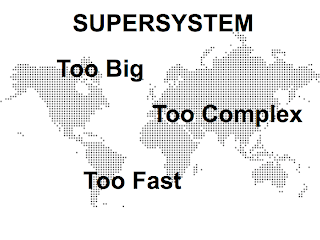Just in time for Christmas, this vision of the future by Robert Paterson after a weekend of conferring with colleagues:
- That there is no soft landing. We are not in a recession. We are not even in a depression. We are at the end of an era. The Tipping Point is of course the financial collapse. The Vast Ponzi Scheme of our financial world - with the vast sums in the Derivative Market and the Credit Bubble all in effect lost - cannot be saved. There is not enough money in the national accounts to pull this back.
- The search for efficiency and the urge to consume has set us all up like a row of dominoes - there is no buffer, no resiliency. As one problem rises it causes another. As one solution is tried it drives another problem. We all pull back and the consumer economy stalls. The auto industry and credit firms feeds the media (40% of conventional advertising). Papers and TV and Radio networks, many subject to LBO's will have to fail as per the Tribune. Every sector will be laying people off. Sales of all things fall off a cliff - driving more business failures and layoffs. Cities and states that depend on sales tax and property tax and the credit markets can rely on none of these. So they too will have to lay off millions - thus making all the problems worse. National governments will be asked to save us all and of course cannot. As States and Cities get squeezed and cannot borrow, they will too lay off millions - teachers, firemen police. No one will be safe
- As all of this is happening - the web is also sweeping through all businesses and gutting all who made artificial scarcity the heart of their model. This would be enough to drive a revolution but now is only one aspect of a perfect storm. There is no time to feel a way into a new model. A new model has to be found in 2009 or your business will die from this alone.
- The world food system is exceptionally connected and tightly coupled. High fertilizer prices in 2008 will drive a food shortage in 2009. Inventories of grain are already low. The collapse of commerce and credit may risk food supplies in 2009. The 2008 rice problem was a harbinger for what is to come
[More]
I do not discount the possibility of the outcomes described above, but too many of them are forced to line up in one direction: decentralized societies rather than nations as the necessary - and not coincidentally, desired - answer. I have suspected for a while that cultural critic would use the financial crisis as justification for a return to more local forms of social organization, to "de-integrate" ("distintegrate" didn't sound right) away from monstrous institutions and especially globalization.
This could occur in the short run. It looks like an attractive and safe answer. But we'll soon discover that without a sophisticated network of systems which evolved because they provided huge benefits outweighing their costs, much of the charm of retrenched civilization fades rapidly. I note the Amish make use of MRI's for example, giving rise to a small industry of folks who shuttle non-driving Amish to hospitals. The point is the astonishing benefits we have developed by slowly providing more linkages between people around the world will be sharply missed once the Great Fallback begins.
Like locavores who are faced with mostly grim root vegetables in February and March, the knowledge that New Zeland apples used to be down at the grocery cannot be unlearned. Even should we choose to retrace our steps economically and culturally, the same huge payoffs will be dangling there for those who re-offer a chance to markedly improve standards of living with just modest investment in technology or integration.
Farmers will be under pressure to embrace agrarian production to fit with this decentralized mythos. A growing sector will serve these communities, but I seriously doubt whether the world can begin to de-urbanize and un-link enough to markedly change our sytems of economics and basic living.
More likely is the emergence of stronger and more independent members of national or international systems. By pushing more decisions and innovation to lower levels, institutions and even governments could better counter the inherent instability of massive entities capable of massive failures such as we have seen. In short, I think we will see new ways to aggregate and achieve economies of scale without stripping smaller components of risk or reward.
We may be about to franchise our culture.
[All Posts]

2 comments:
Here's a bit of good news for us farmers (about half way down the page):
http://tinyurl.com/667nrq
...as in countries producing energy, mineral and food commodities...
Trouble is we depend on much of the rest for our well being.
dairyman dave
I tried that url...and got this warning from zonealarm... High Risk Website Warning!
What happened?
ZoneAlarm has found that http://tinyurl.com/667nrq&useraction=continue may be unsafe.
This website has been known to distribute spyware.
So maybe discretion is a good idea...Bill
Post a Comment